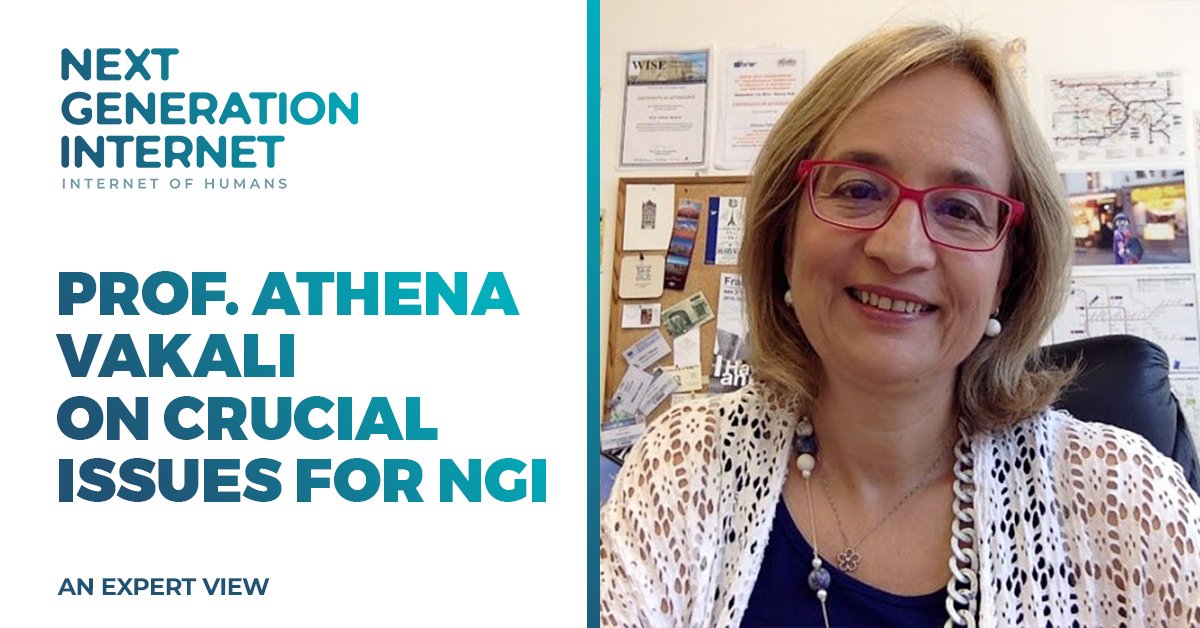 Prof. Athena Vakali, is a leading researcher on Web and Data Science. She shares her expert views on the course ahead to achieve a ‘human-centric’ Internet.
Prof. Athena Vakali, is a leading researcher on Web and Data Science. She shares her expert views on the course ahead to achieve a ‘human-centric’ Internet.
How can we achieve a more human centric Internet?
In my opinion, democratisation and decentralisation are critical to achieve a more human centric Internet. The Internet and its services should not be monopolized by a handful of large IT corporations, but it should rather become a default infrastructure for all. Equally important is the issue of Data sovereignty and Data as a common asset. Users must retain control of their data and decide themselves what to do with them and have a clear input on how their privacy and security will be safeguarded. Data which is potentially useful for society should be available to everyone.
NGI is a champion of Openness. We need more open standards and open source solutions and less proprietary and closed algorithms and systems. Related to this is the issue of Access and Inclusiveness. Everyone should have easy, low cost and quality access to the Internet. We must intensify efforts to provide special care to support people with special needs, which I know some NGI projects are doing.
The issues of Trust, Security and Online Identity – again, areas of interest for NGI – are critical. Users should be able to use Internet services safely. Being identified and being able to identify other users online in a secure way is crucial for establishing online trust.
Which future emerging technology trends are you monitoring and what is their relevance to achieve the NGI vision?
I’m interested to see how the NGI principles and systematics may be defined in terms of a ‘periodic table’ of NGI principles. I envision how the ‘elements’ could be positioned, especially among the major pillars of Big Data, AI, Robotics, and ambient sensing.
The demand for data science solutions and skills will increase in the upcoming years and NGI services should become more standardized and advanced in a systematic manner to ensure data science growth and dominance.
Augmented Analytics and Analytics ‘on the fly’ offer real-time data analytics. I believe knowledge acquisition should be advanced and evolve to offer and support multiple services which embed automated processes in a changing AI and data driven world – for example smart vehicles and automated and connected unmanned aerial vehicles, and so forth.
Ambient sensing and Internet of Everything (IoE) tolerance are key, as NGI projects penetrate many aspects of human and industrial activities. Its stability and resilience should be safeguarded especially in emerging novel domains, from the Internet of Health to the Internet of Sports, etc.
Describe your work and its relevance to the NGI ambition
The Data and Web Science Lab is an active research group engaged in research and innovation on NGI complex data science and engineering technologies, offering end-to-end multi way and multi scope analytics, mainly in line with the next major scientific and innovation processes :
- Social Networks analysis: Online Social Networks and Data Analytics and Graph Mining
- Sensing Data Exploration: Sensing/IoT Technologies and Human Activity Recognition
- Sentiment Analytics: Sentiment and behavioural patterns detection in multi-contextual settings
- Blockchain technologies: Blockchain and Decentralized Technologies, and Data management as well as smart contracts innovation.

What are the main research and innovation challenges the NGI should focus on?
We are living through the Meta-Covid19 era, and in my view, NGI priorities should cover major challenges stemming from the post-pandemic era which will touch a wide range of areas (health, societal, economic, environmental, etc.).
With or without COVID, I am convinced fakeness and fraud detection are imperative. NGI standards should progress in the new Internet era where fake and fraud cases have revealed vulnerabilities in the systems and in services which allow for bias, fake news spreading, fraud usage and information bubbles.
One issue we’re not hearing enough about, in my opinion, is that of human behavioral phenomena regarding technology. Perhaps NGI should support ethical principles for Internet use and in the complex issues which arise from human addiction to media.
The rise of the data economy – how to drive value through the next generation of the Internet?
Data is the cornerstone of today’s Internet. Big data analytics and AI are THE two key technologies with rapid growth and a myriad of applications, built on top of the data economy. The data economy fuels new knowledge, insights and trends that are augmenting human intelligence and creativity, thus generating innovation and producing new value. The future NGI era will play an even more important role in the emerging data market ecosystem. The exponentially increasing volume of data being generated, shared, distributed, used and reused online will feed into the new data-dependent economy making all the more relevant the requirement of an NGI respecting human values and ethics.
How may we achieve a greener Internet for a greener Europe?
The electricity needs of the Internet infrastructure are already huge and they keep growing by its ever-expanding usage and the need for more sophisticated and demanding online services. The pandemic crisis where major populations were locked down in their homes with the Internet being the only option for work, education and entertainment made that trend even more evident. This equates to millions of tons of greenhouse gas emissions required to power, run and cool the vast amount of equipment that makes up the modern Internet. Measures to make the NGI greener may include the following considerations:
- Move away from fossil fuel to the use of renewable energy sources in order to power infrastructure and ensure the regulation of power usage
- Bio-energy and energy from waste
- Smarter data-center operation including demand-based services, internet providers’ orchestration in regional, national and international levels
- Adoption of greener technologies e.g., 5G and low energy sensors
- Investment in environment-friendly and energy-efficient equipment
- Smarter data management such as data minimization, data caching, data availability, data compression and data protocols
- Increased efficiency in data flows such as network topology optimization and data exchange
- Circular use of Internet services including data reuse and next request prediction.
Professor Athena Vakali, Lab Director of the Data & Web Science Laboratory at the Department of Informatics, Aristotle University of Thessaloniki is an NGI4ALL Advisory Board Member with expertise in Web usage mining, content delivery networks on the Web, Web and social Web data clustering and crowdsourcing, and Web operating system principles.
More information on Prof. Athena Vakali: https://www.csd.auth.gr/en/member/athina-vakali/


